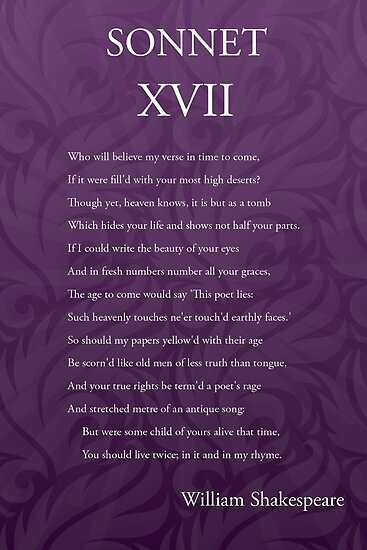

Reason being, beauty lies in the eyes of the beholder, so Shakespeare may believe this to be the most beautiful person to ever have existed while others may simply view them to be ordinary. Your analysis of Shakespeare’s poem is great but do you think that maybe your reading too much into it? From what I got out of the poem was that, through Shakespeare’s eyes, he has never seen a person as beautiful as this, it is as if heaven has touched their face, and that people will never believe that a person so beautiful could exist. Why would the subject live twice? He already admitted that nobody would believe his poem, so how could he count that? Then I smacked myself on the forehead (not metaphorically - it kind of hurt) and realized that the poem could be kind of a plea or challenge to the youth to have kids, because that is the only way that the author's verse will be believed in the future.ĭid you get to choose this sonnet for your paper? If so, what made you choose it over another? The rhyming couplet confused me at first, 'cause I was wondering why he had to bring a kid into it. Line ten is ten syllables too, if scorned is two syllables, but the way I would naturally read it, the second foot has no stresses and the third is a trochee. The only one I can think of offhand is sonnet 29 ("and trouble deaf heaven with my bootless cries"), but if you think of the word as he'en it conforms to the metre better, and I haven't run across a lot of 11 syllable lines in the sonnets before. I've run across "heaven" as a one syllable word a few times before in Shakespeare. Furthermore, I think it's interesting how with Shakespeare when there is deviation in form, it alerts the reader to pay attention to what he is saying in the specific line. I think it is interesting when you pay attention to the form and begin to notice effects it has on the content. Thus the line is split but not in "half," Just as the tomb would show "not half your parts". Something I found after reading it at least fifteen times is in line four, Shakespeare cleverly, places emphasis on the idea of "not half your parts," by placing a caesura which causes a natural break around the middle of the line, which breaks the syllables into a 4/6 count.

Alliteration in line ten, "truth than tongue." Anadiplosis, in line six "an in fresh numbers number all your graces." Lines three and ten are epic.
Sonnet 17 full#
The sonnet is full of all kinds of literary devices. Furthermore, describing this beauty in verse, would only allow once self to attain a glimpse of it, like the glimpse of ones life on a tomb. This notion of the tomb illustrates how the beauty of the subject is so breathtaking that it can be compared to the life of an individual. There is only a mere glimpse of who they were. Thus, not even half of there life is recognizable by their tomb. For a tomb of the dead shows "not half your parts." This meaning that when one dies, all that is left on the tomb of their grave is their name, birth death, and possibly a simple statement to sum up their life. He is noting the similarity to how poetry hides the subjects beauty in the same way that a tomb of the dead would hide ones life. Shakespeare presents the image of a tomb which is linked to the notion of death. Something Godlike and mortal, claiming that nothing this beautiful could stand on earth with mortal beings. What I understand is that Shakespeare is writing of his subjects beauty and he claims that this beauty is so divine, that he doubts his ability, or rather, the ability of the sonnet itself, to capture the image. But after reading and re-reading and analyzing, and finally starting the draft of my essay, it has grown on me. It's funny because when I first read it, I did not like it, nor did I understand it. I've been looking at this sonnet for the past three weeks now. You should live twice: in it, and in my rhyme.

So should my papers, yellowed with their age,īe scorned, like men of less truth than tongue,Īnd your true rights be termed a poet's rageīut were some child of yours alive that time, Such heavenly touches ne're touched earthly faces.' The age to come would say this "This poet lies Which hides your life, and shows not half your parts.Īnd in fresh numbers number all your graces, Though yet, heaven knows, it is but as a tomb

If it were filled with your most high deserts?. Who will believe my verse in time to come


 0 kommentar(er)
0 kommentar(er)
